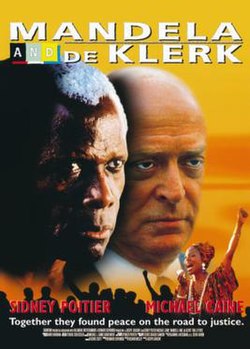| Mandela and de Klerk | |
|---|---|
 | |
| Written by | Richard Wesley |
| Directed by | Joseph Sargent |
| Starring | Sidney Poitier Michael Caine Tina Lifford |
| Music by | Cédric Gradus Samson |
| Country of origin | United States |
| Original language | English |
| Production | |
| Producer | Bernard Sofronski |
| Cinematography | Tobias A. Schliessler |
| Editors | Debra Karen Benjamin A. Weissman |
| Running time | 114 minutes |
| Production company | Showtime Networks |
| Original release | |
| Network | Showtime |
| Release | February 16, 1997 |
Mandela and de Klerk is a 1997 made-for-television drama film written by Richard Wesley and directed by Joseph Sargent. The film stars Sidney Poitier and Michael Caine. The film documents the negotiations between F.W. de Klerk and Nelson Mandela to end South African apartheid, and was nominated for numerous awards in 1997 and 1998. [1] It originally premiered on Showtime on February 16, 1997.